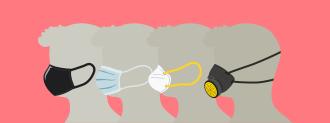The CDC now recommends that Americans wear face masks to prevent the spread of COVID-19 (since April, anyway), but thus far, the federal government has left it up to states to decide what to do with that information.
While some have been requiring residents to wear masks in public for months, others — including Washington, North Carolina, and California — have only just made masks mandatory in the past week, in response to surging COVID-19 case numbers.
Even if you don’t live in a state that requires you to wear a face mask, though, the scientific consensus is that they can help prevent the spread of COVID-19.
But not all masks are created equal — here’s what you need to know about choosing a face mask to combat the coronavirus.
Prevent the Spread of COVID-19
Face masks can be split into two basic categories: disposable and reusable.
While the former tend to be easy to use and effective, they’re also meant to be thrown away after a single use. That means relying on disposable masks during the COVID-19 pandemic would require you to 1) have a large supply, and 2) create a lot of trash.
Choosing a face mask that’s reusable is, therefore, the financially, logistically, and environmentally friendlier option.
Reusable masks are, at their most basic, a fabric covering for your mouth and nose that you wash regularly.
They can range from a t-shirt wrapped around your head to a mass-produced mask sold by your favorite fashion brand. Somewhere in the middle are the homemade masks that have had countless people dusting off their sewing machines in recent months.
According to the CDC, any of these masks appears to be better than no mask at all. But when deciding which is your best option, you’ll need to find one that strikes a balance between effectiveness and comfort.
Choosing a Face Mask
Based on scientific studies, a reusable mask’s ability to prevent the spread of COVID-19 seems closely linked to both the quality of fabric used and the number of fabric layers.
Fabrics with tighter weaves and thicker threads have been shown to block respiratory droplets more effectively than those with looser weaves and thinner threads. Masks with two layers of fabric are more effective than those with just one layer, and those with three layers are better than two.
Research suggests that adding a filter between the fabric layers can also improve a mask’s effectiveness — this can be anything from a paper towel to an insertable HEPA or N95 filter.
When choosing a face mask, opt for one that fits snugly over your mouth and nose — you don’t want one that you’ll have to touch repeatedly to keep in place — but it shouldn’t feel uncomfortably tight, either.
The mask should also be breathable, and this is where striking that balance is important.
If given the choice between a three-layer mask that uncomfortably restricts your breathing and a two-layer one that doesn’t, opt for the latter — a face mask you feel comfortable enough to wear is always going to be more effective than one you leave at home.
We’d love to hear from you! If you have a comment about this article or if you have a tip for a future Freethink story, please email us at [email protected].






